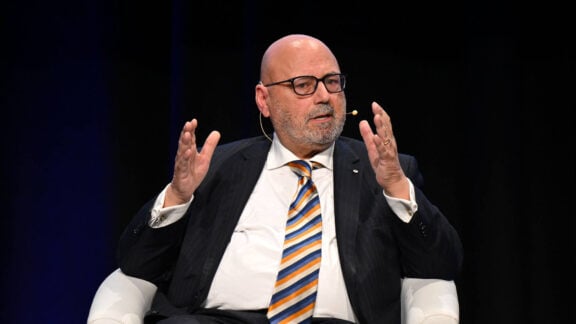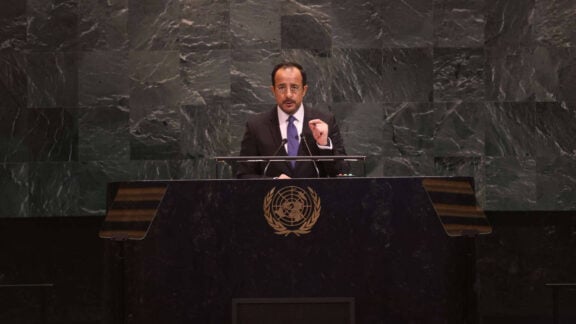If anyone knows how Australian money travels in the global markets these days, it is Matthew Panopoulos. As the National Director of KPMG’s Advisory Business, he is the man who informs some of the biggest investors in the country on how to maximise their wealth and where to place their capital. Superfunds, utilities, as well as mining companies, put their trust and their funds into Panopoulos’ hands every day, with the expectation that they will not regret it.
Panopoulos is an investment insider, one of the best in the business. For the last 18 months, his eyes have been set on the roller coaster activity of the global markets. He watches the steep downturn of Greece and the EU closely, while also keeping a concerned eye on the unending problems of the US economy. As economic problems grow by the minute, Panopoulos talks to Neos Kosmos about a new era dawning.
With major investors as your clients and the global markets in turmoil, can you tell us how the investment community digests the current economic situation?
I am currently advising a major pension fund in Australia investing in very sizeable infrastructure assets in the EU and US…just to give you an idea of the sentiment, while the pension fund that I am advising has plenty of money to deploy, the conditions in Europe in particular, and to a lesser extent in the US, create a lot of nervousness for them to proceed and execute transactions which are multibillion dollar deals.
I see a lot of caution and concerns about participating and investing. We see a lack of movement in investments, which is basically the opposite of what the eurozone needs at this point in time in order to move out of the dangerous economic territory, they are in. The case right now is that investment capital is either withdrawn or withheld from the eurozone. For example banks that have previously funded these assets in the US, and they are all European banks, mostly Spanish banks, are looking to, very quickly, exit these assets and realise some cash to take back to their homeland. Just to put a financial parameter around that, I’ve invested $4 billion in a toll road five years ago in the US and as a bank I am at the moment happy to receive 60 to 70 per cent of that debt I lend today, to take the money back to the EU.
How well is Australia protected from this new GFC wave?
There is a problem out there, no doubt, but we are pretty well protected. We do have some pretty strong economic fundamentals and this will save the day for us. It is not to say we are immune from the problem but given our economic fundamentals and comparing us to other power houses we are in a better state. If we have a downturn in our region, and I mean particularly in China, that will have a more compelling impact on us here than the EU collapsing.
Let’s focus on Greece. Greece is already insolvent and some analysts believe an upcoming default is certain. In the meantime, the Greek Government is trying to deflate rumours that Greece will default. What is your opinion on this issue?
The message we are getting out of Greece at the moment is ‘we are doing a number of things to fix our known problems. These measures range from austerity measures to cutting costs, to the privatisation of major assets to realise some value and a number of other initiatives. It is a bit of scattergun approach but there are a number of different initiatives the Greek government is trying to implement, and in some cases it has, and it was done successfully in order to avoid handing in the keys to the receiver. But some of these initiatives, like the privatisation, cannot go too far ahead.
What do you mean? There is no interest?
The interest might be there but it is not the kind of interest Greece wants. If I am a perspective acquirer of those assets I am buying assets in a fire sale scenario so I am not going to pay what the Greek government asks and the asset will not realise that top end value that they are expecting to achieve, in that kind of environment for a couple reasons.
Firstly, there is a significant amount of counterparty risk and secondly, it is not a process with competitive tension and a high value interest in these assets. Investors understand that the government is in a hurry to sell and while a bidder might have paid $4 billion in other circumstances, now the bidder will offer two because the Greek government will probably accept two. So these assets that were disclosed as a key element of the solution to decreasing Greece’s debt, will not materialise the value that they are expecting. If that does not go to plan then absolutely they will default.
What you are saying is that Greece will default no matter what?
Correct.
What would be the impact of a Greek default in the global market? And what would be the impact to the people’s everyday life in Greece?
I think globally, people have already factored in to their economic decision making that Greece is suffering heavily. I don’t think a formal default from Greece is going to have major implications globally as this has already happened. It is almost like now people are saying, ‘look, that is inevitable, our concern now is whether Italy, Spain or Ireland defaults.’ So I do not think the market will be moving into the unknown world of default and that this will cause a major dent or impact.
The more considered view on domestic implications for Greece though is different. Greece is falling in a recession environment, and there is only one thing that follows recession and that is depression. That’s a stated economic statistic and what comes with it is a lot of pain and heartache for everyday life translated in lack of incomes, decrease of spending power and asset values falling lower.
Will people’s savings in Greek banks be affected?
I would have thought money in a bank, in any financial institution is a safe investment, even if it’s a Greek bank because at the moment all those banks are merging or being bought out, merging or consolidating so you’d expect that your savings are safe. The biggest erosion of value would be in property not for cash in hands. For example a 200,000 euros apartment will be worth half that price after Greece defaults.
What is the best bet for Greece? Postpone the inevitable or to go for it now?
Something inside me says I do not want them to default. It is a personal sentiment and it is bad for all Greeks living in Greece or abroad. I do not want that outcome to occur. It is inevitable though. And the impact of the go forward position for Greece is a five to ten year recapitalisation scenario, if I was to put it in financial terms. They will need five to ten years to restructure the country to turn it around. I can’t see Greece exiting the eurozone because if they were to exit it that would collapse the EU.
I am using examples in my sphere of activity and I would like to add that what is happening to Greece is not an isolated event. Restructuring, receivership, erosion of assets occurs in the private sector everyday and it occurs post GFC more than often. What is happening to Greece economically is no different to what happened to Lehman, during the GFC. To apply those fundamentals, what major economic entities need to do in order to come out of a receivership, is restructuring. It is the same with what Greece needs to do in order to come out of their situation. After all, there is life after a default.








